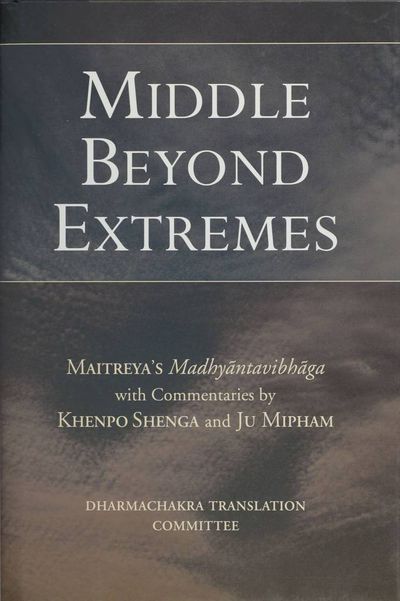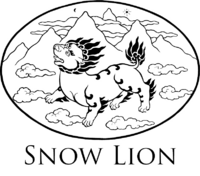- Foreword by Trulshik Rinpoche 9
- Foreword by Chökyi Nyima Rinpoche 11
- Introduction 13
- Distinguishing the Middle from Extremes 19
- Chapter One • The Characteristics 25
- The Characteristics of Thorough Affliction 25
- The Characteristics of Complete Purification 36
- Chapter Two • The Obscurations 47
- General Presentation 47
- Detailed Explanation 49
- Obscurations That Prevent Liberation 49
- Obscurations That Inhibit the Ten Qualities 51
- Obscurations That Inhibit the Three Remedies 59
- Summary 67
- Chapter Three • Reality 69
- Brief Presentation 69
- Detailed Explanation 70
- The Reality of the Three Essential Natures 70
- The Eight Principles 73
- The Ten Topics of Knowledge 84
- Chapter Four • The Path of Practice 103
- The Thirty-seven Factors of Enlightenment 103
- Phases of the Path 115
- Results of the Path 119
- Chapter Five • The Unsurpassable Vehicle 123
- Unsurpassable Practice 124
- The Eminent Practice 124
- Directing the Mind 129
- Concordant Factors 133
- Eliminating Dualistic Extremes 148
- The Specific and the General 154
- Unsurpassable Observation 155
- Unsurpassable True Accomplishment 157
- Unsurpassable Practice 124
- Conclusion 161
- Visual representation of Ju Mipham’s outline 166
- Appendix: Ju Mipham’s Topical Outline of Distinguishing the
Middle from Extremes 167 - Notes 173
- English-Tibetan Glossary 179
- Tibetan-English-Sanskrit Glossary 189
- Bibliography 203
- Index 207
(Created page with "{{Book |BookPerson={{Book-person |PersonPage=Maitreya |PersonName=Maitreya }}{{Book-person |PersonPage=mi pham rgya mtsho |PersonName=Mipam Gyatso }}{{Book-person |PersonPage=...") |
No edit summary |
||
| (4 intermediate revisions by 2 users not shown) | |||
| Line 9: | Line 9: | ||
|PersonPage=gzhan phan chos kyi snang ba | |PersonPage=gzhan phan chos kyi snang ba | ||
|PersonName=Zhenpen Chökyi Nangwa | |PersonName=Zhenpen Chökyi Nangwa | ||
}}{{Book-person | |||
|PersonPage=Dharmachakra Translation Committee | |||
|PersonName=Dharmachakra Translation Committee | |||
}} | }} | ||
|FullTextRead=No | |FullTextRead=No | ||
|TextTranslated=Texts/Madhyāntavibhāga | |TextTranslated=Texts/Madhyāntavibhāga | ||
|BookToc=* {{i|Foreword by Trulshik Rinpoche |9}} | |||
* {{i|Foreword by Chökyi Nyima Rinpoche |11}} | |||
* {{i|Introduction |13}} | |||
* {{i|Distinguishing the Middle from Extremes |19}} | |||
* {{i|Chapter One • The Characteristics |25}} | |||
** {{i|The Characteristics of Thorough Affliction |25}} | |||
** {{i|The Characteristics of Complete Purification |36}} | |||
* {{i|Chapter Two • The Obscurations |47}} | |||
** {{i|General Presentation |47}} | |||
** {{i|Detailed Explanation |49}} | |||
*** {{i|Obscurations That Prevent Liberation |49}} | |||
*** {{i| Obscurations That Inhibit the Ten Qualities |51}} | |||
*** {{i| Obscurations That Inhibit the Three Remedies |59}} | |||
** {{i|Summary |67}} | |||
* {{i|Chapter Three • Reality |69}} | |||
** {{i|Brief Presentation |69}} | |||
** {{i|Detailed Explanation |70}} | |||
*** {{i|The Reality of the Three Essential Natures |70}} | |||
*** {{i| The Eight Principles |73}} | |||
*** {{i| The Ten Topics of Knowledge |84}} | |||
* {{i|Chapter Four • The Path of Practice |103}} | |||
** {{i|The Thirty-seven Factors of Enlightenment |103}} | |||
** {{i|Phases of the Path |115}} | |||
** {{i|Results of the Path |119}} | |||
* {{i|Chapter Five • The Unsurpassable Vehicle |123}} | |||
** {{i|Unsurpassable Practice |124}} | |||
*** {{i| The Eminent Practice |124}} | |||
*** {{i| Directing the Mind |129}} | |||
*** {{i| Concordant Factors |133}} | |||
*** {{i|Eliminating Dualistic Extremes |148}} | |||
*** {{i| The Specific and the General |154}} | |||
** {{i|Unsurpassable Observation |155}} | |||
** {{i|Unsurpassable True Accomplishment |157}} | |||
* {{i|Conclusion |161}} | |||
* {{i|Visual representation of Ju Mipham’s outline |166}} | |||
* {{i|Appendix: Ju Mipham’s Topical Outline of Distinguishing the<br>Middle from Extremes |167}} | |||
* {{i|Notes |173}} | |||
* {{i|English-Tibetan Glossary |179}} | |||
* {{i|Tibetan-English-Sanskrit Glossary |189}} | |||
* {{i|Bibliography |203}} | |||
* {{i|Index |207}} | |||
|AddRelatedTab=No | |AddRelatedTab=No | ||
|StopPersonRedirects=No | |StopPersonRedirects=No | ||
}} | }} | ||
Latest revision as of 12:07, 12 November 2020
Middle Beyond Extremes contains a translation of the Buddhist masterpiece Distinguishing the Middle from Extremes. This famed text, often referred to by its Sanskrit title, Madhyāntavibhāga, is part of a collection known as the Five Maitreya Teachings. Maitreya, the Buddha’s regent, is held to have entrusted these profound and vast instructions to the master Asaṅga in the heavenly realm of Tuṣita.
In pithy verses, Distinguishing the Middle from Extremes employs the principle of the three natures to explain the way things seem to be as well as the way they actually are. Unraveling the subtle processes that condition our thinking and experience, Maitreya’s teaching reveals a powerful path of compassionate vision and spiritual transformation.
Distinguishing the Middle from Extremes is presented here alongside commentaries by two outstanding masters of Tibet’s nonsectarian Rimé movement, Khenpo Shenga and Ju Mipham. (Source: Shambhala Publications)
| Citation | Dharmachakra Translation Committee, trans. Middle Beyond Extremes: Maitreya's Madhyāntavibhāga with Commentaries by Khenpo Shenga (gzhan phan chos kyi snang ba) and Ju Mipham ('ju mi pham rgya mtsho). Ithaca, NY: Snow Lion Publications, 2006. |
|---|---|
- Maitreya (mgon po byams pa): madhyāntavibhāga (dbus dang mtha' rnam par 'byed pa), Otani: (P5522), sems tsam, (phi 43b4-48b1) (vol.108, p.19-21)), (D4021), sems tsam, phi 40b1-45a6. [N] phi 38a2-42a6. (Kinsha) 3521, phi 47b1 (p.25-2-1). In bstan 'gyur (sde dge), Vol. 123: 79-89. Delhi: delhi karmapae choedhey, gyalwae sungrab partun khang, 1982-1985.

- Gzhan phan chos kyi snang ba (1871-1927): dbus dang mtha' rnam par 'byed pa'i mchan 'grel. In gsung 'bum gzhan phan chos kyi snang ba, Vol. 13: 19-68. Khreng tu'u: si khron mi rigs dpe skrun khang, 2006.

- Mi pham rgya mtsho (1846-1912): dbus mtha' rnam 'byed kyi 'grel pa 'od zer phreng ba (dbus dang mtha' rnam par 'byed pa'i bstan bcos kyi 'grel pa 'od zer phreng ba). Bylakuppe: ngagyur nyingma institute, 2002.



